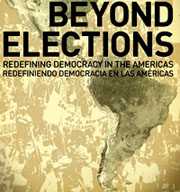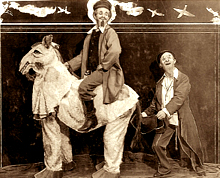
Month: October 2008


On Columbus Day, Correcting Columbus’ Legacy
On Monday, Oct. 13, schoolteachers across the nation should find the courage to speak the truth about the man who sailed the ocean blue in 1492. Trying to explain to youngsters how this country came to be is surely no easy task. How can you sugarcoat telling a fourth-grader that Columbus did not "discover" the "new" world - that he more accurately opened the door to conquering it?

Beyond Elections: Redefining Democracy in the Americas
Beyond Elections is a documentary that takes us across the Americas to attempt to answer one of the most important questions of our time: What is Democracy? Freedom, equality, participation? Everyone has his or her own definition. Across the world, 120 countries now have at least the minimum trappings of democracy-the freedom to vote for all citizens. But for many, this is just the beginning not the end. Watch and discuss this timely and inspiring film on Thursday, October 16 at 7PM at Burlington College in Burlington, Vermont.

Life as Commerce: Criticizing Market-Based Conservation

Martial Law on the Horizon? US Troops Hit the US Streets
On October 26, 2006, in an article for Toward Freedom, journalist Frank Morales broke the story about George W. Bush’s move toward implementing martial law in the US. According to Morales, Bush was doing so "by revising the Insurrection Act, a set of laws that limits the President’s ability to deploy troops within the United States." The law "allows the President to declare a ‘public emergency’ and station troops anywhere in America and take control of state-based National Guard units without the consent of the governor or local authorities, in order to ‘suppress public disorder.’" This article went on to win a #2 Project Censored Award in 2007.

Old Days of the Radical Jews: How American Yiddish Theater Survived Through Satire
The world of Yiddish theater in its glory days on Second Avenue in Manhattan of the 1910s-1940s seems like one more leftwing Jewish tale of another faraway universe. However, the productions have not ceased entirely and various forms of translations bring the theater to new audiences. What we've lost more than anything is the vernacular qualities, the ways in which this theater drew upon various forms of entertainment and edification from the shtetl to the immigrant ghetto, and how fully it engaged an excited and sometimes infuriated Jewish public.
